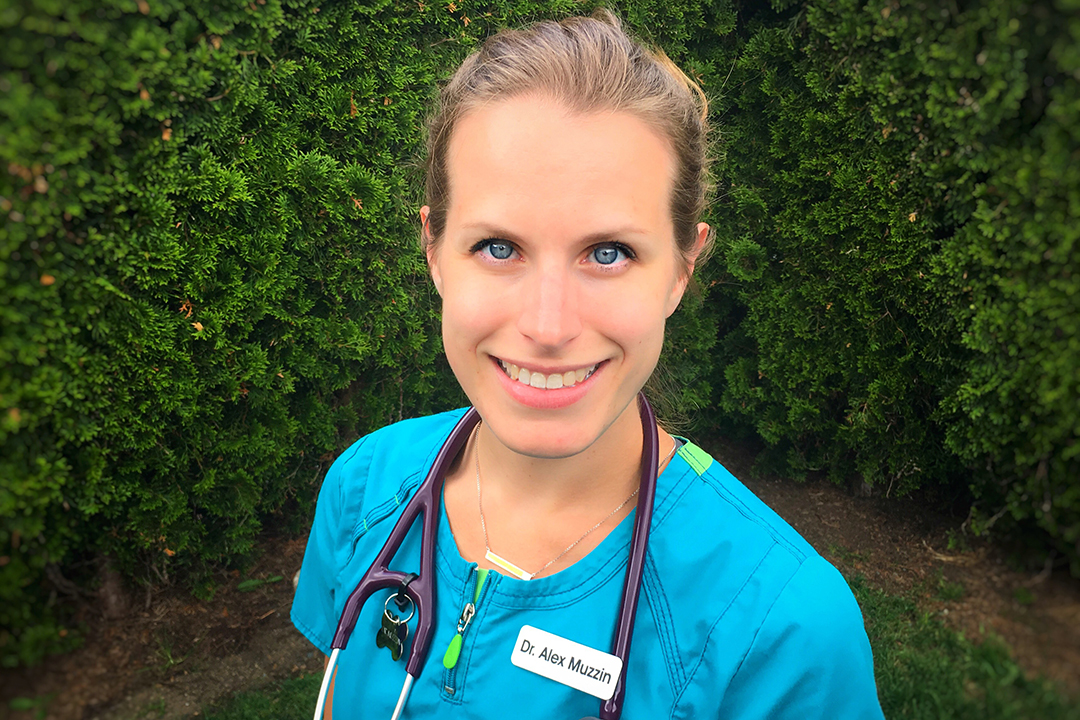
Dual degree sets up veterinarian for lifelong learning
One of the biggest lessons Dr. Alex Muzzin has learned as a small animal veterinarian is to pay almost as much attention to the people walking through her doors as she does to the pets they bring with them.
By HenryTye GlazebrookIt might seem counterintuitive at first — the pets themselves are the ones in need of her medical expertise, after all — but Muzzin has found that the human beings she interacts with can often hold the key to a clearer understanding of the animal patients she treats at Van Isle Veterinary Hospital in Courtenay, B.C.
“I think a lot of times we’re actually treating our clients just as much as we’re treating our patients,” Muzzin says. “Our clients own and love our patients; these animals are their family members. The patients can’t talk to us, so we really have to be able to speak to clients in ways that they understand and in ways that they feel comfortable so that they can open up.”
Muzzin is still a relatively recent addition to the veterinary field, completing her veterinary education at the Western College of Veterinary Medicine (WCVM) in 2014. She remained at the University of Saskatchewan for another year to take part in a new initiative that allowed veterinary students to graduate with joint Master of Business Administration (MBA) and Doctor of Veterinary Medicine (DVM) degrees.
This joint degree program is a unique element in Muzzin’s education and sets her apart from many of her contemporaries. The process was taxing with a larger workload and a complicated scheduling process, but Muzzin says she was confident that having both experiences would greatly help her as she entered into her career.
“I realized that having a good understanding of the business and management side of a veterinary practice is integral to the success of any private practice,” she says. “The MBA program was the most logical way to broaden my skill set as a veterinarian working in small animal private practice.”
Muzzin describes the past few years since entering into practice as a rush of activity. There’s nary a moment to sit still between day-to-day interactions with patients, getting accustomed to working in a live environment and maintaining a grip on the ever-changing discipline of animal medicine.
“There’s a lot of information and it’s always expanding, so I think it’s kind of difficult to get everything in,” she says. “But that’s the nature of medicine, whether that’s human or animal. Things are always evolving and changing, and we’re constantly learning new techniques for surgery or treatments for medical cases. Almost every day, I see something new or learn something new or explore something new. That’s the nature of the beast, really.”
Muzzin recalls a certain level of impatience during her first few years at WCVM and being antsy to participate in the hands-on work with animals reserved for more senior students. But today she looks back on that time fondly, certain that it was the foundation laid in her education that gave her the confidence to succeed not only in her practical coursework but in her career.
“One of the benefits of being in the classroom so much in the first three years was that we learned so many facts that could be applied once we got into clinical rotations in fourth year,” Muzzin says. “I think in the end, it really benefited all of us that we had so much background information.”
Just as important are the connections that Muzzin made at WCVM. What started as classmate friendships forged through shared notes and late-night studying have since transformed into colleagues she can count on to this day to provide a fresh perspective on a difficult case.
“We’re all dispersed now, not only in Canada but elsewhere in other countries,” Muzzin says. “But there’s always someone you can reach out to for advice, practical knowledge on different experiences and what they did in certain situations. I never quite feel like I’m alone, even though I don’t get to work directly with any of my fellow 2014 graduates.”
Muzzin has held a lifelong love of animals. Allergies within her family meant there could be no pets in her childhood household so she took her enthusiasm out into her community.
“I lived in a cul de sac and the neighbourhood pets were always out and about,” says Muzzin, who grew up in Coquitlam, B.C. “I definitely loved walking the neighbours’ dogs and snuggling with their cats.”
HenryTye Glazebrook is a freelance writer based in Vancouver, B.C.
